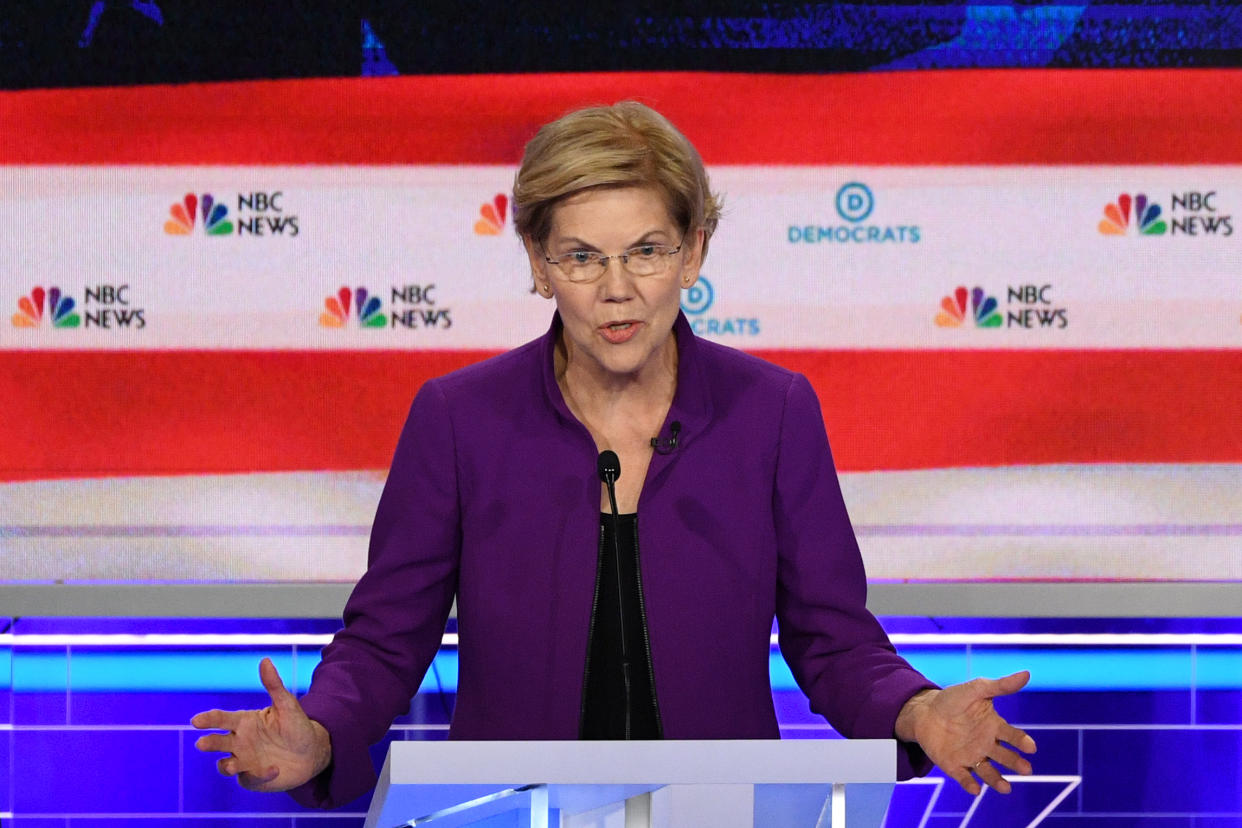Health care question divides Democratic field
During Wednesday evening’s Democratic presidential debate, a question on which candidates would support eliminating private health insurance marked the first apparent policy difference among the contenders. Only two hands — those of Sen. Elizabeth Warren and New York City Mayor Bill de Blasio — went up. Warren, who had drawn criticism from some on the left for having a muddled health care position, made an impassioned case when moderator Lester Holt asked her about Sen. Bernie Sanders’s Medicare for All bill, which she co-sponsored.
“I’m with Bernie on Medicare for All and let me tell you why,” said Warren. “I spent a big chunk of my life studying why families go broke, and one of the number one reasons is the cost of health care, medical bills. And that’s not just for people who don’t have insurance, it’s for people who have insurance. Look at the business model of an insurance company: It’s to bring in as many dollars as they can in premiums and to pay out as few dollars as possible for your health care. That leaves families with rising premiums, rising co-pays and fighting with insurance companies to try and get the health care that their doctors say that they and their children need. Medicare for All solves that problem.”
Related: Explaining the Democratic health care plans >>>
“And I understand,” added Warren. “There are a lot of politicians who say it’s just not possible, we just can’t do it, have a lot of political reasons for this. What they’re really telling you is they just won’t fight for it. Well, health care is a basic human right and I will fight for basic human rights.”
The universal coverage proposal Warren championed would eventually end Medicare as it exists, along with Medicaid and private insurance, replacing them with a health care plan that would cover all patient bills without the need for supplemental insurance. The Medicare for All plan, as outlined, would cover routine doctor visits, surgery, mental health, prescription drugs, dental and vision for everyone in America. It would also cover women’s health services such as abortion, a controversial position that would require the repeal of the Hyde Amendment, which prevents federal money to be used for abortions.

Sen. Amy Klobuchar of Minnesota then made the case for a public option, pointing out that that was the position of President Barack Obama in the early stages of passing the Affordable Care Act. She said she was “simply concerned about kicking half of America off their health insurance in four years, which is exactly what this bill says.”
The basic idea for a public option is to allow some or all Americans the option to buy into a public Medicare or Medicaid-style plan if not the programs themselves. Supporters of the public option say it would allow those who like their private insurance plans to keep them and reduce the disruption to the economy. Supporters of a single-payer plan like Medicare for All say that a public option is simply another incremental step, like Obamacare, that perpetuates the power and profits of the private insurance industry while failing to achieve universal coverage.
Former Texas Rep. Beto O’Rourke, who had supported Medicare for All in the House, said he had changed his position and wouldn’t eliminate private insurance, because he wanted Americans, particularly those who had negotiated plans through unions, to have a choice. He was cut off by de Blasio, prompting the first real exchange between candidates of the evening.
“Congressman O’Rourke, private insurance isn’t working for tens of millions of Americans when you talk about the co-pays, the deductibles, the premiums, the out-of-pocket expenses, it’s not working,” said de Blasio. “How can you defend a system that’s not working?”
At this point former Maryland Rep. John Delany joined the conversation.
“It should be noted that 100 million Americans like their health insurance, by the way,” said Delaney. “I think we should be the party that keeps what’s working and fixes what’s broken. Doesn’t that make sense? We should give everyone in this country health care as a basic human right for free, full stop. But we should also give them the option to buy private insurance, why do we have to stand for taking away something from people.”
In the post-debate spin room, Delaney told reporters he was the only one telling the truth on health care and attempted to prognosticate the general election.
“I don’t love private insurance any more than anyone else does but I also know that 150 million Americans have it, and 100 million of them like it,” said Delaney. “And we’re going to run on making that illegal? Donald Trump would beat us by 10 points.”
Other candidates offered slightly different approaches. Sen. Cory Booker of New Jersey said he supported Medicare for All (he’s also a co-sponsor of the Sanders bill), but that he favored getting there over a series of steps, while Washington Gov. Jay Inslee pointed out that his state had passed a public option. Holt asked former Housing and Urban Development Secretary Julian Castro if his plan would cover abortion, to which Castro said, “Yes,” and that he believed in “reproductive justice.”
“What that means is just because a woman or let’s also not forget someone in the trans community, a trans female, is poor doesn’t mean they shouldn’t have the right to exercise that right to choose, so I would absolutely cover the right to have an abortion,” said Castro, to cheers.
The American health care system is among the most expensive in the world, and has some of the highest prescription drug costs. At the same time, 28 million people are without health coverage and 79 million have medical debt, while crowdfunding sites to cover medical expenses are proliferating.
Additional contributions by Brittany Shepherd from Miami.

Read more from Yahoo News:

